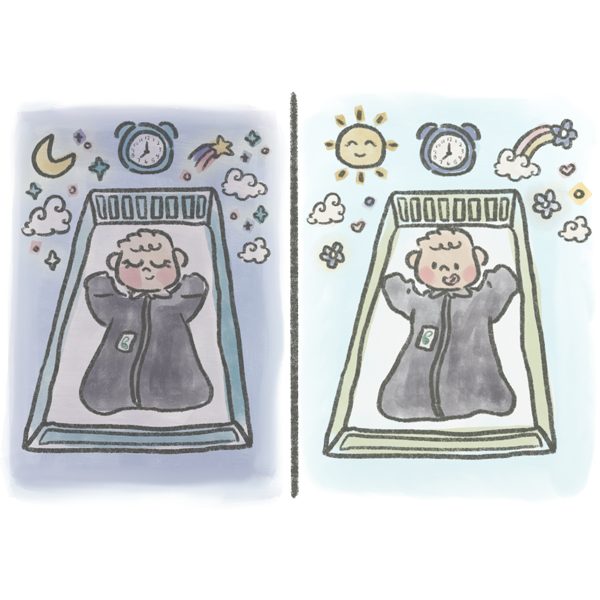Is Your Baby's Circadian Rhythm Out of Sync?
Ever wondered why we're most alert when the sun is shining and sleepy when it's dark outside? It's all thanks to our Circadian Rhythms (also known as our internal body clock) - an internal system that regulates our physical, mental, and behavioural changes over a 24-hour period.
Circadian Rhythms and Sleep
Circadian comes from "circa diem", Latin for "approximately a day". These approximately 24-hour cycles are found in most organisms, from humans to fruit flies, plants and even tiny microbes have their own Circadian Rhythms. Although our Circadian Rhythms are self-sustained, they are adjusted to the local environment by externals cues such as light, darkness, and temperature. Being awake during the day and sleeping at night is an example of light-related Circadian Rhythm.
In humans our Circadian Rhythms are regulated by a group of nerve cells within the hypothalamus (part of our brain) called the suprachiasmatic nucleus or SCN. The SCN is connected to our optic nerves, allowing it to respond to light and dark. So in the morning when our optic nerves sense light, the SCN send signals to raise our temperature, heart rate, blood pressure, and delay the release of hormones like melatonin. When it’s dark at night, the SCN signals our body to release melatonin, which makes us drowsy. That’s why our Circadian Rhythm tends to coincide with the cycle of daytime and nighttimes.
Consequences of Disrupting Circadian Rhythms
Circadian Rhythms can influence our sleep patterns, hormone releases, eating habits, digestion, cell regeneration, body temperature and other important bodily functions. It's believed that up to 15% of our genes may be regulated by Circadian Rhythms!
Irregular Circadian Rhythms have been linked to various chronic health conditions, such as sleep disorders, obesity, diabetes, depression and dementia. The problem is that our daily schedules do not correlate with sunrise and sunset anymore, with working and studying, and late night screen time; we're constantly fighting that master clock that's been trying to keep us in sync.
Your Baby's Circadian Rhythms
The life of a newborn revolves primarily around getting fed. Their sleep patterns are shaped by length of time it takes them to feed, digest, and become hungry again. This means feeding every few hours, with short sleep sessions spaced in fairly regularly around the clock.
A newborn’s sleep patterns aren't cued to the natural cycle of day and night. They begin to develop a strong internal body clock only from 3 months old, and some babies can take much longer. Which means for most babies it may take 3-5 months before they settle at night - meaning that they sleep for more than 5 hours at a stretch.
Helping Your Baby Attune Themselves to Their Circadian Rhythms
It is natural to think that this is one of those development stages that we just have to wait out. On the contrary, research suggests that you can help your baby attune themselves faster to their circadian rhythm. And by laying the groundwork early on, you may avoid some infant sleep problems later on.
Here are some handy tips on how to help your baby adapt to the 24-hour day and achieve better quality sleep. These tips are useful even for older kids as well as us parents who are experiencing disruptions (i.e., having irregular sleep patterns) with their internal body clock.
Tip 1 - Support your baby's tendency to awaken at roughly the same time each morning.
You and your baby's circadian rhythm works best with regular sleep habits, like going to bed at night and waking up in the morning around the same times from day to day (including weekends). This is important, because waking up at roughly the same time each day helps keep the body's circadian rhythms attuned.
Tip 2 - Expose your baby to sunlight in the morning and afternoon.
Make sure you expose yourself and your baby to daylight during the morning and afternoon. This is vital for you and your baby in setting your internal clocks to the same time. It also helps you keep your circadian rhythms from drifting, which is important to avoid insomnia and be a source of day-time cues for your newborn. Even if you are sleep-deprived, morning light exposure helps ensure that you will be more alert during the day than you are at night.
Tip 3 - Make your baby a part of your daily routine.
Some researchers believe that social cues have the strongest influence in newborn sleep pattern than any other environmental factors. Studies have found that when parents include their newborns in their daily activities, newborn sleep patterns adapt more rapidly to the 24-hour day.
Tip 4 - Wind things down as the sun goes down.
In the evenings, wind down to low-key activities, keep lights dimmed, and reduce noise. This helps baby to learn that nighttimes are for sleep and quiet.
Tip 5 - Avoid exposure to artificial lights at night.
Avoid exposure to artificial lights before and during bedtime, particularly light sources that feature light from blue part of the spectrum. Blue light blocks our brain's production of melatonin, a hormone that promotes sleepiness. Sources of blue light include the sun, digital screens, electronic devices, and fluorescent and LED lighting.
When your baby wakes for night time feedings, keep activity to a minimum, make as little noise as possible, and avoid moving your baby around. If you can, keep lights out, even while you soothe or feed your baby.
Tip 6 - Cooler bedrooms are better for sleep.
Night is signalled by a fall in temperature, so cooler bedrooms are better. Recommended nursery temperature by health professionals is around 18-20 degrees Celsius.
Tip 7 - Give your baby a soothing massage.
Studies have shown that newborns who received more frequent massage from their mother showed more mature sleep patterns (falling asleep faster, staying asleep longer, and awakening at night less often) and higher level of nocturnal melatonin, compared to newborns who weren't massaged.
The soothing, gentle, and affectionate physical contact may have something to do with it.
Tip 8 - If breastfeeding, keep track of the time you are expressing.
If you are breast feeding, keep track of the time of the day you express and store breast milk for future use. Breast milk contains tryptophan, an amino acid that is used by the body to manufacture melatonin. Tryptophan levels rise and fall according to maternal circadian rhythms. Studies have found that when infants consume tryptophan before bedtime, they fall asleep faster and got more sleep overall.
Your baby's circadian rhythm will likely change with age. And he/she may not have the same sleep-wake cycles as you or your partner. But the more attention you pay to you and your baby's feelings of alertness and drowsiness, and the more time you spend developing good sleep habits for yourself and your baby, the better both of you will slumber and feel.
Always consult with your physician or other qualified healthcare provider if you have any concerns about your baby's health, or if you are considering any supplements.
We wish you and your baby lots of restful nights’ sleeps!


 New Zealand Dollar (NZD)
New Zealand Dollar (NZD)
 Hong Kong Dollar (HKD)
Hong Kong Dollar (HKD)
 Japanese Yen (JPY)
Japanese Yen (JPY)
 Singapore Dollar (SGD)
Singapore Dollar (SGD)
 South Korean Won (KRW)
South Korean Won (KRW)
 United Arab Emirates Dirham (AED)
United Arab Emirates Dirham (AED)
 Canadian Dollar (CAD)
Canadian Dollar (CAD)
 British Pound (GBP)
British Pound (GBP)
 Euro (EUR)
Euro (EUR)
 Swiss Franc (CHF)
Swiss Franc (CHF)
 Swedish krona (SEK)
Swedish krona (SEK)







